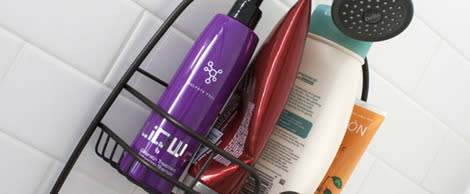How Often Should You Switch Your Shampoo?
by Candice Chan, Birchbox

While we were growing up, we kept hearing the same shampoo myth: rumor had it that if you used the same formula day after day, your hair would eventually lose its luster and bounce. The solution was regularly changing bottles and brands to keep your strands guessing. Now that we're older and wiser, we wanted to find out truth-how often do we really have to switch our shampoo? That's why we asked Doug Bielanski, the national director of education at Frederic Fekkai, to give us the inside scoop.
"I want to put a kebash on the misnomer that your hair builds a tolerance to a specific shampoo and conditioner," Bielanski says. "That's a myth." What is true, however, is that like any other beauty regimen, your hair products should change based on several factors. Here, Bielanski told us the key times that you should be swapping your formulas.
Related:Finding the Right Shampoo For Your Hair Type
Seasonal Shifts
"Hair is a dynamic and diverse part of the body that's exposed to the elements-especially weather or climate," says Bielanski. This means matching your haircare to the temperature and environment. Summer heat can leave scalps oilier than normal, so Bielanski recommends reaching for a less-hydrating option with a volumizing formula to help amp up overall lift. For winter, opt for products with super moisturizing ingredients (like Fekkai'sshea butter-infused essential shea shampoo) to rehydrate strands that have been scorched by over-heated, under-humidified indoor environments.
Related:SHU UEMURA Cleansing Oil Shampoo
Dietary Changes
Eating fat (good or bad!) can give your hair that much-desired shine and gloss. "If you're getting essential fatty acids from red meat or an avocado, you may feel like you need less moisturizing products," Bielanski says. But for those lean-eaters who forego fat, know that locks can end up looking dry or parched. "You need a hair mask for five minutes, once or twice a week, to push humectants back in the hair."
Maturing, Over-processing, and Medical Treatments
"Hair naturally changes with age," says Bielanski. "When hair starts to thin or become brittle, it needs something that will help restore its instrinsic strength to help it appear fuller." Formulas packed with reparative proteins, like soy or milk, can gently help build up or mend hair that's been damaged by heat, over-processing, or even intense medical treatments like chemotherapy or radiation.
See more at Birchbox:
Finding the Right Shampoo For Your Hair Type
How To: Studded Nail Art
The At-Home Spa Treatment I Can't Get Enough Of
